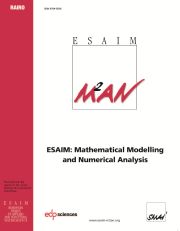Article contents
An eddy current problem in terms of a time-primitive of the electric field with non-local source conditions∗
Published online by Cambridge University Press: 17 April 2013
Abstract
The aim of this paper is to analyze a formulation of the eddy current problem in terms of a time-primitive of the electric field in a bounded domain with input current intensities or voltage drops as source data. To this end, we introduce a Lagrange multiplier to impose the divergence-free condition in the dielectric domain. Thus, we obtain a time-dependent weak mixed formulation leading to a degenerate parabolic problem which we prove is well-posed. We propose a finite element method for space discretization based on Nédélec edge elements for the main variable and standard finite elements for the Lagrange multiplier, for which we obtain error estimates. Then, we introduce a backward Euler scheme for time discretization and prove error estimates for the fully discrete problem, too. Finally, the method is applied to solve a couple of test problems.
Keywords
- Type
- Research Article
- Information
- ESAIM: Mathematical Modelling and Numerical Analysis , Volume 47 , Issue 3 , May 2013 , pp. 875 - 902
- Copyright
- © EDP Sciences, SMAI, 2013
References
- 8
- Cited by




